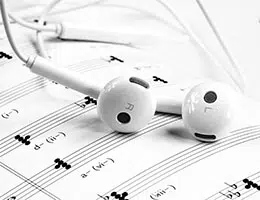 MP3 is an acronym derived from MPEG Audio Layer III . It is a digital audio format or, more specifically, a compression format for said type of audio.
MP3 is an acronym derived from MPEG Audio Layer III . It is a digital audio format or, more specifically, a compression format for said type of audio.
To generate an MP3 file , an algorithm is used to reduce the size or weight of the file that stores the sound , although with a certain loss of quality . This loss, however, is not usually significant, which is why MP3 is the most used format on computers and portable players.
The German sound engineer Karlheinz Brandenburg is credited as the creator of the MP3. He was among those responsible for the development of the Moving Pictures Experts Group ( MPEG ) and in the 1980s began working on audio compression. Already in 1995 , it began to use the .mp3 extension for audio files compressed under this system.
The MP3 format represented a revolution in the way digital audio was distributed and consumed. MP3 files are much lighter (and therefore easier to transfer or download) than files on an audio CD or CDDA . With the advancement of Internet connections, it became easier to download entire albums whose songs were compressed into MP3.
The digital audio player is also known as MP3. These devices can save and play files in MP3 format, although they are generally able to work with other formats as well.
A person, for example, can store two hundred songs on an MP3 and then listen to them wherever and whenever they want. All of this tells us that the MP3 was a great invention, revolutionizing the way we store and listen to our music, facilitating actions such as moving our entire music collection from one country to another to a level that in the past would have been a luxury. of few people.
 However, everything surrounding this compression format is not positive. First of all we must talk about piracy : in its early years, MP3 was synonymous with "stolen music", since due to the small size of the files it was possible to upload entire albums to the Internet so that any user could download them freely. This did not go unnoticed by record labels, much less by artists, but it was a phenomenon that generated large losses of money in the music industry.
However, everything surrounding this compression format is not positive. First of all we must talk about piracy : in its early years, MP3 was synonymous with "stolen music", since due to the small size of the files it was possible to upload entire albums to the Internet so that any user could download them freely. This did not go unnoticed by record labels, much less by artists, but it was a phenomenon that generated large losses of money in the music industry.
One of the measures that little by little was bringing the industry afloat was the sale of music in digital format, both MP3 and AAC (the iTunes format), among others; We could say that he adopted the saying "if you can't beat them, join them." Unlike pirated discs , those purchased come with the digital booklet, the quality of which is impeccable and far superior to the scanned version that pirates usually include in their packages, as well as certain songs that are not found on the physical disc.
In addition to combating illegal downloading with the sale and inclusion of exclusive material, another determining factor was quality: one of the outstanding characteristics of the MP3 format is that it can offer different degrees of compression , and the differences between very small files (such as being the 96 kbps) and the large ones (320 kbps) can be appreciated effortlessly.
Without a doubt, the eventual offers help a lot to convince people to buy instead of stealing . But none of this can change the mentality of those who are absolutely stuck in their ideas, those people who download games, movies, music and books without paying for them, claiming that "the creators already have enough money."
